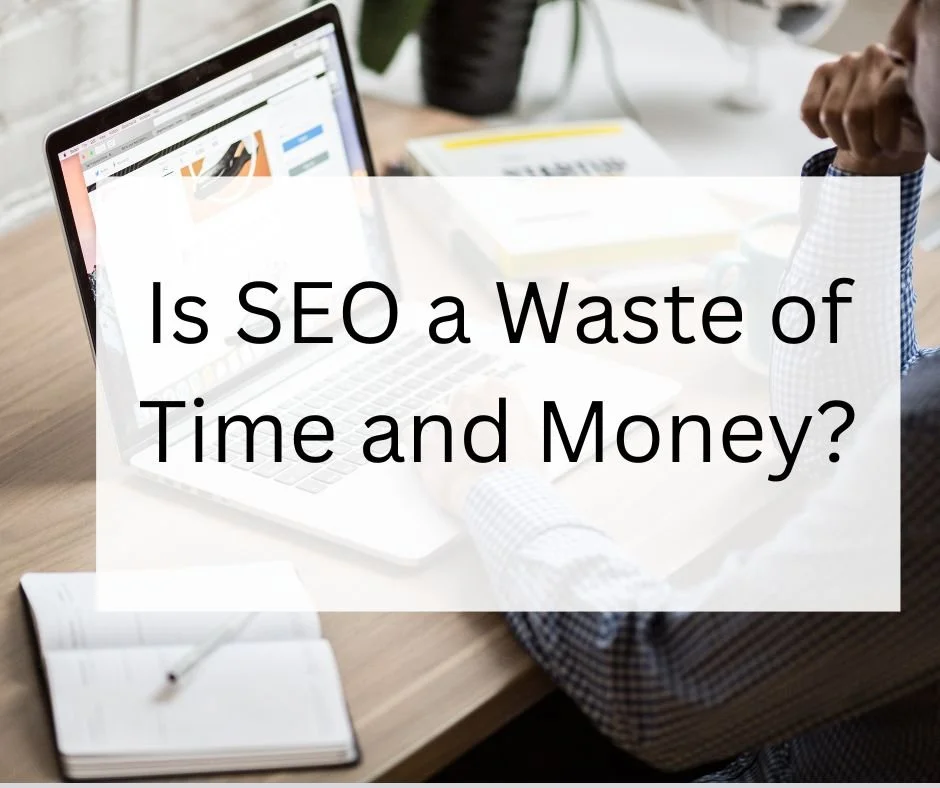Is SEO Worth It for My Small Business? Breaking Down the ROI
I see this question come up all the time. On Facebook groups, Reddit, and in SEO discussions everywhere: “Is SEO actually worth it?”
The answer? It depends.
It depends on how much you’re paying, the quality of work you’re receiving, and, most importantly, what kind of results you’re seeing over time.
Think of SEO like planting a fruit tree. You don’t drop in a seed and expect apples next week. You water it, nurture it, and wait a few months before it starts producing anything. But when it does? That tree can keep feeding your business for years to come.
In this post, I’ll show you exactly how to calculate your SEO ROI, especially if you're already paying for SEO services. I’ll also share where it gets tricky (like when you’re running multiple marketing strategies at once), and how to track your gains so you can confidently answer the question: Is this working?
If you’ve just started working with an SEO consultant or agency, keep in mind that it usually takes 3–6 months to see real traction, especially if you’re building from scratch. But understanding ROI early on can help you set the right expectations and make smarter decisions moving forward.
If you’ve had a bad experience in SEO and your data shows it’s been a waste, read this article: Is SEO a Waste of Time and Money?
SEO can be one of the best marketing investments a small business makes. In fact, SEO leads have an average close rate of 14.6%, compared to just 1.7% from more traditional methods like cold calling or direct mail. That’s a pretty big difference. (Seoprofy)
What does SEO ROI actually look like in the real world?
Let’s take a look at one of my own clients - a local fabric shop here in Seattle. After starting with a local SEO strategy and then expanding into e-commerce SEO, we were able to track some pretty exciting results:
Revenue from Organic Search: Revenue directly related to organic traffic increased by 11.85% in 3 months.
Revenue from Local Sales: Local sales grew by 71.8% in 6 months.
Clicks to Website: Organic clicks to the website increase by 36.46% in 3 months.
And it’s not just my clients seeing these kinds of results…
Industry research backs this up. SEO continues to deliver strong, measurable ROI for small businesses across the board:
High ROI: A quality SEO campaign can achieve an average ROI of 748%, meaning for every dollar invested, businesses see a return of $7.48.
SagapixelLocal Search Impact: Approximately 28% of local searches result in a purchase within 24 hours, highlighting the effectiveness of local SEO strategies.
localiq.comCost-Effectiveness: SEO costs are 61% lower than paid search campaigns while delivering higher ROI, making it a cost-effective marketing strategy.
pageoptimizer.pro
But here’s the catch: not all SEO work is created equal.
Some agencies or freelancers promise results but do very little behind the scenes, or worse, use outdated tactics that can actually hurt your rankings.
That’s why it's so important to know what to look for when hiring help. (If you’re not sure what questions to ask, check out this post on how to choose the right SEO specialist or agency.)
How to Calculate the ROI of your SEO
Traffic and clicks are great, but real SEO success comes down to whether it's helping you reach your business goals, like bringing in more sales, bookings, or leads. That’s why it's so important to look beyond vanity metrics and focus on what actually moves the needle.
This article explains how to set and measure SEO goals that align with your business goals, which typically involve revenue.
To ensure SEO has a good return on investment (ROI), the extra revenue it generates should outweigh the monthly cost of SEO services. The basic ROI formula is:
(Gain from investment - Cost of investment) / Cost of investment
Let’s say you hire an SEO consultant or agency for $1000 per month. After one month, your revenue from organic traffic increases by $800. That means you have no positive ROI yet (-$200) because you paid them more than the extra brought in. The next month, your sales from organic traffic increase another $300 (so by $1100 compared to before SEO), so you are still at a slight loss with the two months combined (-$100). By the third month, your sales from organic traffic went up up another $400 (so $1500 increase from first month). Now you have made a profit of $400 over 3 months.
Let’s break that down mathematically for you:
Month 1: Pay $1000, gain extra $800. (loss $200)
800 - 1000 = -200 (loss) -25% ROI
Month 2: Pay $1000, gain extra $1100. (gain $100 this month, but combines both months loss $100)
(800+1100) - (1000+1000) = -100 (loss) -5% ROI
Month 3: Pay $1000, gain extra $1500 (gain $500 this month, but combined all three months gained $400)
(800 + 1100 + 1500) - (1000 + 1000 + 1000) = 400 (gain) +13.3% ROI
Now here’s where it gets cool. Even if all that happens is that you maintain that same level of sales from organic search for 3 more months without making any new gains, you profits continue to grow:
(800 + 1100 + 1500 + 1500 + 1500 + 1500) - (1000 + 1000 + 1000 + 1000 + 1000 + 1000) = $1900 (gain) +31.7% ROI
So imagine the payout if this continues to maintain for years. Now imagine if it continues to grow instead of just maintain…
But here’s where things get tricky: How do you measure your gain from SEO if you have multiple marketing strategies running at the same time?
For example, how do you know whether your increased sales are from SEO, social media marketing, paid ads, or word of mouth?
If you have an e-commerce store, this is relatively easy to track in Google Analytics. Shopify and other platforms provide reports that break down revenue by traffic source, so you can see exactly how much came from organic search (SEO).
But for service-based and other businesses, it’s not always so simple.
If you get leads from phone calls, referrals, or direct website visits, tracking SEO’s exact impact requires additional effort. Some ways to isolate SEO’s contribution include:
Google Search Console data → Measures organic clicks and rankings.
UTM tracking links → Helps distinguish traffic sources in Google Analytics.
Call tracking numbers → Assigns unique phone numbers to organic traffic.
Customer surveys → Asking "How did you find us?" in intake forms.
A good SEO strategy should not just increase traffic, but increase the right kind of traffic that leads to conversions. That’s why measuring ROI is more than just tracking website visits. It’s about seeing real business growth.
If you've been investing in SEO for a while and you're not seeing results, it's worth digging deeper. Sometimes the issue isn’t SEO itself, but it’s that the strategy or execution isn't right for your business. Here’s what to do if your SEO isn’t working.
So lets look at some examples of SEO being worth it and not worth it…
Real-Life ROI Looks Different for Every Business
When we talk about ROI, it’s not always a clean-cut dollar amount from a single sale. For many small businesses, SEO pays off in ways that build momentum and long-term growth. Here are a few examples of how that might look:
A local dog walker invests in SEO and lands one new client after three months. That client books weekly walks for the next two years, generating consistent, reliable income. Far beyond the initial cost of SEO.
A travel blogger doubles their website traffic over six months. That traffic growth opens the door to more affiliate income, brand sponsorships, and even paid press trips. None of which would have been possible without improved visibility in search results.
A business consultant focuses on SEO-driven content and grows their email list from 100 to over 1,000 subscribers in a year. That list becomes a pipeline for future service sales, digital products, or course launches, making SEO a long-term lead-generation machine.
In each case, SEO isn’t just about more clicks. It’s about attracting the right audience and turning that visibility into real, measurable business results over time.
When SEO Isn’t Worth It (Yet)
SEO has incredible potential, but only when it’s paired with the right strategy and execution. Here are a few examples where business owners invested in SEO, but didn’t see the return they hoped for:
A photographer paid an agency $1,200 a month for a year and saw more traffic to their website and some impressive keyword rankings, but not a single new client. The agency never asked about their ideal customer or updated the site to convert visitors into leads. (Lesson: if your SEO agency isn’t focused on results, not just rankings, it’s time to fire them.)
A web designer has been blogging consistently for years and is getting steady traffic, but no leads or client inquiries. The problem? The blog content doesn’t align with what their clients are actually searching for or need help with and it’s not content that will convert. (Lesson: content without strategy is just noise. It's time for a new approach.)
A small bakery paid $600 for an SEO audit. What they got was a massive PDF full of technical jargon and no clear next steps. No implementation help, no guidance, no strategy. (Lesson: a good SEO audit should come with actionable recommendations, not just a data dump.)
SEO isn’t magic. It has to be paired with smart planning, real expertise, and clear business goals. When it’s not, you can waste a lot of time and money on “optimization” that doesn’t actually help your business grow.
So, is SEO worth it?
It comes down to this: if the revenue you're bringing in from organic traffic ends up being more than what you’re paying for SEO, then yes, it's worth it. That’s your return on investment. But that’s not necessarily easy to measure depending on your business
And just like planting that apple tree, you can’t expect fruit overnight. It takes the right conditions, consistent care, and time. If you’ve just started investing in SEO, don’t panic if you’re not seeing results in the first few weeks. Real growth usually takes a few months to start showing.
That said, not all SEO efforts are equal. I’ve seen cases where people invested in SEO but didn’t see a return, either because they weren’t working with the right partner, didn’t have a clear strategy, or were tracking the wrong goals. On the other hand, when SEO is aligned with your actual business goals (like getting more clients, selling more products, or growing your email list) it becomes a powerful long-term asset.
When it’s working, you’re no longer chasing customers. They’re finding you. That’s the long game of SEO. And when it’s done right, it can pay off for years to come.
Not sure if your SEO is really working for you?
I offer SEO audits and strategy sessions that go beyond the usual reports. I'll show you exactly what's working, what's not, and how to get better results.
→ Contact me today to get started.










